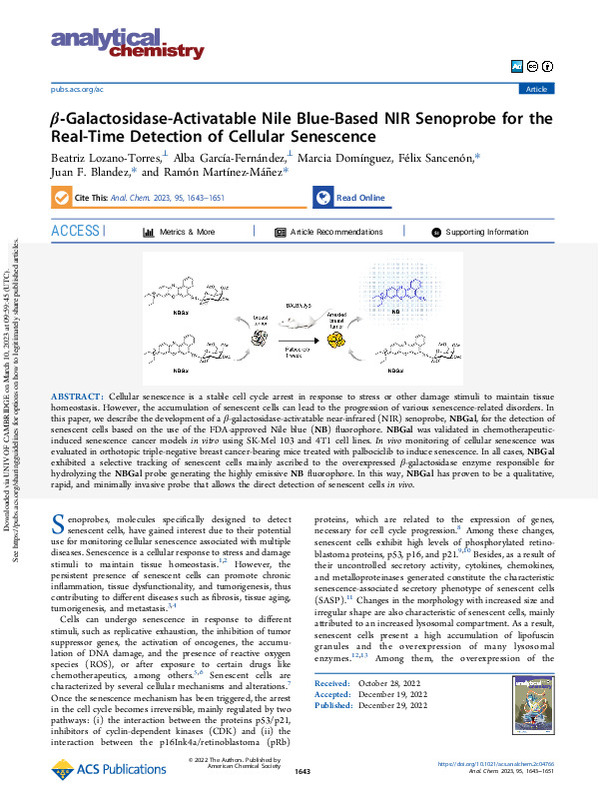JavaScript is disabled for your browser. Some features of this site may not work without it.
Buscar en RiuNet
Listar
Mi cuenta
Estadísticas
Ayuda RiuNet
Admin. UPV
B-Galactosidase-Activatable Nile Blue-Based NIR Senoprobe for the Real-Time Detection of Cellular Senescence
Mostrar el registro sencillo del ítem
Ficheros en el ítem
| dc.contributor.author | Lozano-Torres, Beatriz
|
es_ES |
| dc.contributor.author | García-Fernández, Alba
|
es_ES |
| dc.contributor.author | Domínguez-Rodríguez, Marcia
|
es_ES |
| dc.contributor.author | Sancenón Galarza, Félix
|
es_ES |
| dc.contributor.author | Blandez, Juan F.
|
es_ES |
| dc.contributor.author | Martínez-Máñez, Ramón
|
es_ES |
| dc.date.accessioned | 2024-04-11T07:53:43Z | |
| dc.date.available | 2024-04-11T07:53:43Z | |
| dc.date.issued | 2023-01-17 | es_ES |
| dc.identifier.issn | 0003-2700 | es_ES |
| dc.identifier.uri | http://hdl.handle.net/10251/203321 | |
| dc.description.abstract | [EN] Cellular senescence is a stable cell cycle arrest in response to stress or other damage stimuli to maintain tissue homeostasis. However, the accumulation of senescent cells can lead to the progression of various senescence-related disorders. In this paper, we describe the development of a ß-galactosidase-activatable near-infrared (NIR) senoprobe, NBGal, for the detection of senescent cells based on the use of the FDA-approved Nile blue (NB) fluorophore. NBGal was validated in chemotherapeutic- induced senescence cancer models in vitro using SK-Mel 103 and 4T1 cell lines. In vivo monitoring of cellular senescence was evaluated in orthotopic triple-negative breast cancer-bearing mice treated with palbociclib to induce senescence. In all cases, NBGal exhibited a selective tracking of senescent cells mainly ascribed to the overexpressed ß-galactosidase enzyme responsible for hydrolyzing the NBGal probe generating the highly emissive NB fluorophore. In this way, NBGal has proven to be a qualitative, rapid, and minimally invasive probe that allows the direct detection of senescent cells in vivo. | es_ES |
| dc.description.sponsorship | The authors acknowledge financial support from the Spanish Government (PID2021-126304OB-C41) and the Generalitat Valenciana (PROMETEO CIPROM/2021/007). This work was also supported by CIBER-Consorcio Centro de Investigacion Biomedica en Red-(CB06/01/2012), Instituto de Salud Carlos III, Ministerio de Ciencia e Innovacion. B.L.-T. is grateful to the Spanish Ministry of Economy for their Ph.D. grants (FPU15/02707). J.F.-B. thanks to his postdoctoral fellowship Sara Borrell from ISCIII (CD19/00038). | es_ES |
| dc.language | Inglés | es_ES |
| dc.publisher | American Chemical Society | es_ES |
| dc.relation.ispartof | Analytical Chemistry | es_ES |
| dc.rights | Reconocimiento (by) | es_ES |
| dc.subject | 2-Photon fluorescent-probe | es_ES |
| dc.subject | Cancer | es_ES |
| dc.subject | Biomarker | es_ES |
| dc.subject | Cells | es_ES |
| dc.subject.classification | QUIMICA ORGANICA | es_ES |
| dc.subject.classification | QUIMICA INORGANICA | es_ES |
| dc.title | B-Galactosidase-Activatable Nile Blue-Based NIR Senoprobe for the Real-Time Detection of Cellular Senescence | es_ES |
| dc.type | Artículo | es_ES |
| dc.identifier.doi | 10.1021/acs.analchem.2c04766 | es_ES |
| dc.relation.projectID | info:eu-repo/grantAgreement/AEI/Plan Estatal de Investigación Científica y Técnica y de Innovación 2021-2023/PID2021-126304OB-C41/ES/NUEVOS MATERIALES Y SONDAS PARA EL RECONOCIMIENTO, LIBERACION DE FARMACOS, NANOMOTORES Y COMUNICACION/ | es_ES |
| dc.relation.projectID | info:eu-repo/grantAgreement/GVA//CIPROM%2F2021%2F007/ | es_ES |
| dc.relation.projectID | info:eu-repo/grantAgreement/ISCIII//CB06%2F01%2F2012//CIBER-BBN / | es_ES |
| dc.relation.projectID | info:eu-repo/grantAgreement/ISCIII//CD19%2F00038/ | es_ES |
| dc.relation.projectID | info:eu-repo/grantAgreement/MECD//FPU15%2F02707//FPU15/02707/ | es_ES |
| dc.rights.accessRights | Abierto | es_ES |
| dc.contributor.affiliation | Universitat Politècnica de València. Escuela Técnica Superior de Ingenieros Industriales - Escola Tècnica Superior d'Enginyers Industrials | es_ES |
| dc.description.bibliographicCitation | Lozano-Torres, B.; García-Fernández, A.; Domínguez-Rodríguez, M.; Sancenón Galarza, F.; Blandez, JF.; Martínez-Máñez, R. (2023). B-Galactosidase-Activatable Nile Blue-Based NIR Senoprobe for the Real-Time Detection of Cellular Senescence. Analytical Chemistry. 95(2):1643-1651. https://doi.org/10.1021/acs.analchem.2c04766 | es_ES |
| dc.description.accrualMethod | S | es_ES |
| dc.relation.publisherversion | https://doi.org/10.1021/acs.analchem.2c04766 | es_ES |
| dc.description.upvformatpinicio | 1643 | es_ES |
| dc.description.upvformatpfin | 1651 | es_ES |
| dc.type.version | info:eu-repo/semantics/publishedVersion | es_ES |
| dc.description.volume | 95 | es_ES |
| dc.description.issue | 2 | es_ES |
| dc.identifier.pmid | 36580602 | es_ES |
| dc.identifier.pmcid | PMC9850349 | es_ES |
| dc.relation.pasarela | S\485213 | es_ES |
| dc.contributor.funder | Generalitat Valenciana | es_ES |
| dc.contributor.funder | Instituto de Salud Carlos III | es_ES |
| dc.contributor.funder | Agencia Estatal de Investigación | es_ES |
| dc.contributor.funder | Universitat Politècnica de València | es_ES |
| dc.contributor.funder | Ministerio de Educación, Cultura y Deporte | es_ES |







![[File]](/themes/UPV/images/mime.png)

